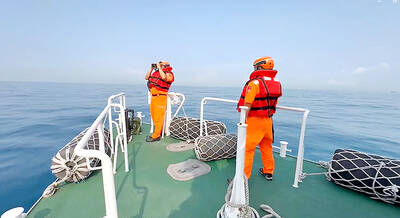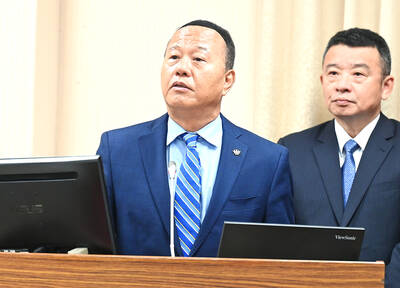Taiwan Power Co (Taipower) said yesterday it is still considering filing an appeal against a court ruling it lost after the Atomic Energy Council (AEC) charged the firm with making arbitrary changes to the design of the Fourth Nuclear Power Plant in Gongliao District (貢寮), New Taipei City (新北市).
The Chinese-language Liberty Times (the Taipei Times’ sister newspaper) reported yesterday that the Taipei High Administrative Court ruled against Taipower in an administrative lawsuit against the AEC, which imposed a fine of NT$15 million (US$500,000) on Taipower for violating Article 14 of the Nuclear Reactor Facilities Control Act (核子反應器設施管制法).
It said the AEC discovered that Taipower had arbitrarily altered as many as 700 parts of the Fourth Nuclear Power Plant design, starting in 2010.
The Liberty Times report also said that Taipower claimed the changes had to be made as the result of a contract dispute with US-based General Electric, the plant’s designer, and that they would not affect safety at the plant, but that the court did not accept the company’s explanation.
In response to the court ruling, Taipower chief nuclear energy engineer and spokesperson Chai Fu-feng (蔡富豐) said the company had not decided whether it would appeal the ruling and that most of the changes made to the design had been approved by the original manufacturer.
“They [General Electric] have approved most of our methods [for altering the design],” Chai said, adding that the changes had been made before General Electric could review them because Taipower did not want to set back the construction schedule and that about 97 percent of the alterations had since been approved by the US firm.
Taipower is still communicating with General Electric on the other 3 percent, Chai said.
In addition, Taipower said it has already asked specialists to conduct a safety risk assessment on the altered design of the nuclear power plant to ensure that it is safe.

An increase in Taiwanese boats using China-made automatic identification systems (AIS) could confuse coast guards patrolling waters off Taiwan’s southwest coast and become a loophole in the national security system, sources familiar with the matter said yesterday. Taiwan ADIZ, a Facebook page created by enthusiasts who monitor Chinese military activities in airspace and waters off Taiwan’s southwest coast, on Saturday identified what seemed to be a Chinese cargo container ship near Penghu County. The Coast Guard Administration went to the location after receiving the tip and found that it was a Taiwanese yacht, which had a Chinese AIS installed. Similar instances had also

GOOD DIPLOMACY: The KMT has maintained close contact with representative offices in Taiwan and had extended an invitation to Russia as well, the KMT said The Chinese Nationalist Party (KMT) would “appropriately handle” the fallout from an invitation it had extended to Russia’s representative to Taipei to attend its international banquet last month, KMT Chairman Eric Chu (朱立倫) said yesterday. US and EU representatives in Taiwan boycotted the event, and only later agreed to attend after the KMT rescinded its invitation to the Russian representative. The KMT has maintained long-term close contact with all representative offices and embassies in Taiwan, and had extended the invitation as a practice of good diplomacy, Chu said. “Some EU countries have expressed their opinions of Russia, and the KMT respects that,” he

AMENDMENT: Contact with certain individuals in China, Hong Kong and Macau must be reported, and failure to comply could result in a prison sentence, the proposal stated The Chinese Nationalist Party (KMT) and the Taiwan People’s Party (TPP) yesterday voted against a proposed bill by Democratic Progressive Party (DPP) lawmakers that would require elected officials to seek approval before visiting China. DPP Legislator Puma Shen’s (沈伯洋) proposed amendments to the Act Governing Relations Between the People of the Taiwan Area and the Mainland Area (臺灣地區與大陸地區人民關係條例), stipulate that contact with certain individuals in China, Hong Kong and Macau should be reported, while failure to comply would be punishable by prison sentences of up to three years, alongside a fine of NT$10 million (US$309,041). Fifty-six voted with the TPP in opposition

VIGILANCE: The military is paying close attention to actions that might damage peace and stability in the region, the deputy minister of national defense said The People’s Republic of China (PRC) might consider initiating a hack on Taiwanese networks on May 20, the day of the inauguration ceremony of president-elect William Lai (賴清德), sources familiar with cross-strait issues said. While US Secretary of State Anthony Blinken’s statement of the US expectation “that all sides will conduct themselves with restraint and prudence in the period ahead” would prevent military actions by China, Beijing could still try to sabotage Taiwan’s inauguration ceremony, the source said. China might gain access to the video screens outside of the Presidential Office Building and display embarrassing messages from Beijing, such as congratulating Lai